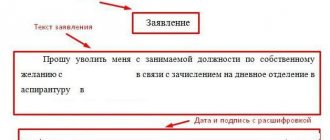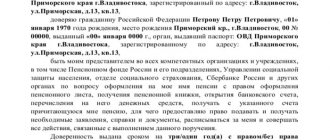Dismissal of a pensioner at the initiative of the employer
A working pensioner is not limited in any way in his rights compared to other categories of workers.
Age is not a reason for dismissal if there are no other claims against a person’s business qualities (Article 3 of the Labor Code of the Russian Federation). This means that the salary of a working pensioner must continue to be accrued in full in accordance with the employment contract. ATTENTION! Dismissal due to retirement against the will of an employee is discrimination against his or her labor rights. For forced dismissal due to retirement, the employer faces a fine.
Dismissal of a working pensioner, like any other company employee, is legally possible if:
- The company is being liquidated. Read more about this in the material “The procedure for dismissal due to liquidation.”
- The employer is downsizing. Read more here.
- The employee is not suitable for the position held.
- The owner of the organization changes (only the management team can be fired).
- The employee’s guilt has been proven (for example, for appearing at the workplace in a state of intoxication, etc. in accordance with paragraphs 5 and 6 of Article 81 of the Labor Code of the Russian Federation).
- The employee has lost the trust of the employer (for example, if his actions caused damage to the company).
How to dismiss an employee for all the above reasons, read the material “The procedure for dismissing an employee at the employer’s initiative.”
Registration in “1C: Salary and Personnel Management 8”, ed. 3.1
Let's consider the preparation of information for establishing a pension (SZV-STAZH) in the program "1C: Salary and Personnel Management 8", ed.
3.1. Information in the SZV-STAZH form is generated by the report “Information on the insurance experience of insured persons, SZV-STAZH”. To do this, go to the “1C-Reporting” section and click on the “Create” button and select the document “Information on the insurance experience of insured persons, SZV-STAGE”. In the “Information Type” field, indicate “Pension Purpose.”
To go directly to the generated information, double-click on the line with the employee. As a result, the “Information about experience” form opens. The form indicates the employee's length of service from the beginning of the calendar year to the date of expected retirement. If at this time the employee had special periods of service (temporary disability, leave without pay, periods of work under special conditions giving the right to early retirement, etc.), they must be indicated (filled in automatically). When changing or adding data, you must click on the OK button.
Next, in the document form, click on the “Record” button located in the top command bar of the form. Before transferring information, it is recommended to check it for compliance with the requirements of the Pension Fund. To do this, click on the “Check” button. In this case, the report is checked using the verification algorithm built into the 1C program. In addition, information can be checked using third-party programs that must be pre-installed on the computer (click on the “ Yes " in the message that appears on the screen after the built-in information check).
If information is transferred to the Pension Fund of Russia without using online services, then by clicking the “Print” button you can generate a printed form of the information “SZV-STAZH”, as well as a list of transferred documents in the EDV-1 form. Using the “Upload ” , the package (forms SZV-STAZH and ODV-1) is uploaded to the specified catalog for transmission to the territorial body of the Pension Fund in electronic form. The program assigns file names automatically.
If the organization is connected to the 1C-Reporting service, then documents can be sent directly from the program. Before sending, it is recommended to perform format and logical control of filling out forms. To do this, click on the “Submit ” and select the action “Check on the Internet ” . To send data, click on the “Send ” and select the action “Send to the Pension Fund”.
After accepting the information from the Pension Fund of Russia, the document should be protected from changes using the “Document accepted by the Pension Fund of Russia (not editable)” checkbox, and then post it. After this, you can edit the document only by unchecking the specified checkbox.
Many employers, when dismissing employees due to retirement, pay them a one-time incentive for conscientious work. This money is included in labor costs when calculating taxable profit (Article 255 of the Tax Code of the Russian Federation). Such payments are subject to insurance contributions and must be taken into account when calculating the pension amount. They must be included in other costs associated with production and sales (Article 264 of the Tax Code of the Russian Federation).
Moreover, if a one-time payment is framed as financial assistance, then within 4,000 rubles. it is not subject to insurance premiums for the year (Article 9 of Law No. 212-FZ). When issuing severance pay, a personal income tax benefit is established. Payments made upon the dismissal of an employee into retirement are exempt from personal income tax in an amount not exceeding in general three times the average monthly earnings or six times the average monthly earnings for employees dismissed from organizations located in the Far North and equivalent areas.
Dismissal of a pensioner by agreement of the parties
In the case where the employer is interested in dismissing a pensioner, but he does not want to leave, a compromise is possible in the form of dismissal by agreement of the parties (Article 78 of the Labor Code of the Russian Federation).
The employee and employer must determine terms that are acceptable to both parties. Before issuing an order, we recommend that you sign a bilateral agreement, which states that the parties have reached mutual agreement, and also indicates the date of the upcoming dismissal and other conditions.
For a sample agreement to terminate an employment contract, see here.
Whether payments upon termination of an employment contract by agreement of the parties need to be subject to personal income tax and contributions, you will learn from the publication “Dismissal by agreement of the parties: personal income tax, contributions . ”
Exceptions to the rules
A number of categories of workers have the right to retire earlier; for others, there is an age limit, after reaching which they must be fired.
Right to early retirement
The Law of the Russian Federation “On Labor Pensions in the Russian Federation” stipulates that certain categories of workers have the right to earlier retirement. For example, the following have the right to receive an early pension:
- employees who were injured during hostilities and became disabled for this reason;
- employees who work in the Far North;
- mothers raising five or more children;
- mother or father of a disabled child;
- those suffering from rare types of diseases or having Group I visual impairment (under certain conditions);
- working underground, in dangerous or harmful conditions;
- military personnel;
- teachers;
- medical personnel;
- ballerinas;
- flight attendants;
- employees who were laid off due to staff reduction.
Dismissal of a pensioner at his own request
At his own request, a retired employee can leave work at any time. To do this, he just needs to write a statement indicating the date on which he intends to terminate the employment relationship.
The rule of advance (2 weeks) warning to a pensioner does not apply if the basis for dismissal is retirement (Part 3 of Article 80 of the Labor Code of the Russian Federation). That is, the employee must be fired on the date specified in his resignation letter.
For a sample of an employee’s application in connection with retirement, see ConsultantPlus. If you do not have access to the K+ system, get a trial online access for free.
Dismissal due to retirement is formalized by order. An entry is made in the work book: “Dismissed at his own request due to retirement, paragraph 3 of part one of Article 77 of the Labor Code of the Russian Federation.”
In the SZV-TD form, in the “Reason for dismissal” column, also record the entry “Due to retirement”
Submitting the SZV-STAZH form
Upon reaching retirement age, an employee can contact the employer with an application to send personalized accounting information to the Pension Fund ahead of schedule . In this case, the employer is obliged to provide this information. If the employee does not make such a statement, then the employer is not obliged to take any action. But still, it is advisable to warn employees who are approaching retirement age that this form will be needed to calculate their pension.
If there is an application, the employer must submit information about the pensioner to the Pension Fund using the form SZV-STAZH . One of the purposes of this form is to transmit information about insured persons who need to take into account the periods of the current calendar year to establish a pension. In this case, SZV-STAZH is submitted with the type “Pension Assignment” . The period for preparing the form and sending it to the Pension Fund is 3 days from the date when the employee submitted the corresponding application.
Is it possible for a pensioner to be re-dismissed at his own request without working out?
Often, after retiring for a well-deserved rest, pensioners get a job again and, terminating the employment relationship once again, again indicate the reason in the application: “In connection with retirement.” In this case, regardless of what is written in the application, dismissal occurs on general grounds. If the grounds for dismissal are indicated incorrectly in the application, you must ask the employee to rewrite it. If the dismissed person refuses to do this, the manager, affixing the visa on the application, must write: “I don’t mind dismissing on general grounds with 2 weeks of work.”
If a working pensioner leaves without working, and the employer fires him for absenteeism, the court will most likely take the company’s side (appeal ruling of the Moscow City Court dated July 26, 2017 in case No. 33-29119/2017).
ConsultantPlus experts explained in detail how to prepare documents when dismissing a worker due to retirement. To do everything correctly, get trial access to the system and go to the Ready solution. It's free.
Document flow upon dismissal
Since the dismissal of a citizen on the basis of retirement is practically no different from the dismissal of any other employee, the rules for document flow do not have any special features. This procedure is carried out by the human resources department or accounting department, but sometimes the employer himself.
The document flow in the organization upon dismissal is as follows:
- A corresponding entry is made in the employee’s personal card indicating the date, grounds (personal statement) and details of the order. Also, the personal card must contain the signature of the former employee;
- the relevant data is entered into the Journal of the movement of work books;
- reporting is submitted to the Pension Fund of Russia.
In some cases, the resigning employee is required to return the completed bypass sheet .
Upon dismissal, the employer is obliged to give out all the employee’s documents (work book and others) in his possession. An employee may also ask to be given a certificate of earnings for the previous 2 years (or a shorter period), a certificate in form 2-NDFL, etc.
Is it possible to withdraw an application if dismissal due to retirement has already taken place?
After writing a statement, the employee voluntarily retired. The organization issued an order and fired him from the date specified in the application. After some time, the person changed his mind and wrote a new application, this time about recalling the previous one.
In this situation, the employer has the right to refuse the pensioner, since the employment relationship with the employee has already been terminated. You can only withdraw your own resignation letter within a 2-week notice period. In this case, the employee, as a pensioner, resigned immediately, without warning.
Read more about withdrawing your resignation letter at your own request here.
You can find out how to return over-withheld tax to a fired pensioner by reading the article “Art. 231 Tax Code of the Russian Federation: questions and answers" .
Is it possible to get a job after indexation?
Current legislation does not prohibit pensioners from working. Therefore, after receiving indexation, you can get a job again. For example, return to your old job or get a job with a new employer.
Another question is, will the pension be reduced upon new employment? No, they don't have the right. For example, citizen Byudzhetnikov B.B. I worked in retirement for 4 years. During all this time, his payments were not indexed and amounted to 8,000 rubles. He retired in 2021. His state pension was indexed to the indicators of four calculation years and amounted to 9644 (8000 + 20.55%). Later, Byudzhetnikov got a job. His indexed pension of 9644 will remain unchanged. That is, representatives of the Pension Fund cannot reduce payments by the amount of indexation performed. It is illegal.
Compensation for missed vacation
The procedure for providing compensation for unpaid leave is described in Article 127 of the Labor Code.
It is determined based on average earnings (per day) and the number of days of unused vacation. The latter is calculated by multiplying the number of vacation days (per month) by the number of months of work. In this case, days already taken off are excluded from the calculation.
Information
The amount of vacation pay per year is generally 28 days (other options are possible). So, for example, disabled workers are given 30 days of vacation, workers in hazardous industries are given 35 days, etc.
The calculation itself is based on the average salary based on the amount of vacation pay
Registration of a preferential pension
In the case of a preferential pension, the HR department prepares documents to confirm the benefit. To do this, you must provide the following to the Pension Fund:
- reference (at the end of the article);
- constituent documents;
- certificate of entry into the Unified State Register of Real Estate;
- certificate of registration with the tax authority;
- information letter from statistical authorities with OKVED;
- license or certificate of admission to a certain type of work (SRO);
- staffing schedule;
- job descriptions or production instruction cards, etc.;
- copies of workplace certification documents, certification cards, state examination reports of working conditions;
- copies of local acts describing production technology;
- copies of documents on the availability of equipment;
- other documents confirming preferential length of service.
The Ministry of Finance spoke about the indexation of pensions for working pensioners in 2022
The final position of the Government on the issue of indexation of pensions for working pensioners was announced by Finance Minister Anton Siluanov. Back on October 28, 2021, during his speech in the State Duma, he stated that the department opposes the return of indexation of pensions for citizens who continue to work. The Ministry of Finance considers the current concept in relation to this category of pensioners fair for the following reasons:
- Even without indexation, the incomes of working pensioners increase annually due to rising wages. At the same time, the Ministry of Finance refers to Rosstat data on annual wage growth at rates higher than inflation.
- All missed indexation for the period of employment will be taken into account upon dismissal and determination of the final pension amount.
Based on the above, the Ministry of Finance believes that it is inappropriate to change the indexation rules adopted in 2021, since the main task of the Government is to ensure a high growth rate of income for the population as a whole. For employed pensioners, it is implemented in full due to rising wages.
In turn, State Duma deputies propose to reconsider the existing indexation procedure, at least for working disabled people and citizens with low wages. Let us note that the issue of restoring the indexation of working disabled people was also discussed with the President, who, in turn, proposed to consider this option and calculate its feasibility.
Payments due to an employee
The employer is obliged to pay the employee upon dismissal. These are the following mandatory payments:
- Salary for the period worked.
- Compensation for unused vacation.
- Compensations, the need for payment of which is specified in the internal regulations of the company.
An employer may, at its discretion, pay an employee a one-time bonus. The amount of this payment is set by the head of the company. The amount of the incentive is included in labor costs. You must pay income tax on the payment. Insurance premiums are also paid with the incentive.
However, the employer can formalize the incentive as financial assistance. Such amounts up to 4,000 rubles are not subject to insurance premiums. In addition, according to the law, payments to a retiring employee will not be subject to personal income tax if they do not exceed three times the monthly salary.
What to do if payments are not paid
Since the list of required payments is approved by law or a local act, which is an official document, therefore their payment is mandatory in the territory of the country or one enterprise, respectively. Violation of this mandatory condition leads to adverse consequences and ultimately to the payment of due funds. The main thing is not to leave the situation unattended and act clearly and competently in accordance with all the rules and regulations of the law.
So, to protect the rights of workers, including former workers, you can contact the labor inspectorate with a complaint. This department, based on an application from an employee, will conduct a review of the legality of payments upon dismissal of an employee and, based on its results, will make a decision.
Additionally
If an appeal to this department does not yield results, then you can go to court.
Northern terms
For citizens who worked in the Far North and equivalent areas, retirement age begins 5 years earlier than the period established by law. Due to the increase in the retirement age for all Russians, northerners also go through a ten-year adaptation period. The only difference is that the pension, as before, begins 5 years before the deadline established for everyone else.
The length of service according to Northern tariffs for early retirement remains the same - 15 years in the Northern region and 20 years in areas that are equivalent to it. For insurance experience, the requirements also do not change - 20 years for women and 25 for men.
Some categories of residents of the North will not have to adapt to changes in retirement age; for them it will remain the same. These categories of citizens include indigenous and small peoples of the North. They are considered pensioners aged 50 and 55, and women who have raised two or more children. They are paid a pension from the age of 50, if they have accumulated the required northern and insurance experience.









